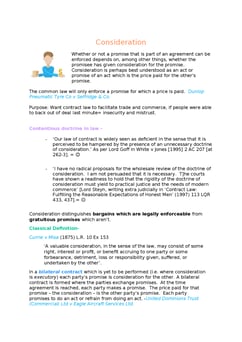Credit Lyonnais v Burch [1997] 1 All ER 144
Judgement for the case Credit Lyonnais v Burch
Table Of Contents
Defendant (an 18 year old) was convinced by her employer to put up her flat as collateral for the company’s overdraft (no explanation was given by the bank to Defendant of the potential consequences).
When it went bust, the bank (Plaintiff) sought to repossess it.
CA held that on the grounds of undue influence the agreement was void.
Nourse LJ
There was manifest disadvantage to Defendant and there is a presumption of undue influence. She can set aside her agreement against the bank directly, despite the fact that it was X who unduly influenced her, since the bank failed to warn her of the true consequences.
A bank could not, in circumstances where it ought to appreciate the possibility that undue influence had been exercised, escape the consequences by putting forward an unnecessarily onerous form of guarantee and relying on the guarantor's solicitor to advise her of the possibility of offering a less onerous and more appropriate guarantee.
For Further Study on Credit Lyonnais v Burch

Contract law notes fully updated for recent exams at Oxford and Cambrid...
Need instant answers? Our AI exam tutor is here to help.
Ask questions 🙋 Get answers 📔 It's simple 👁️👄👁️
Our AI is educated by the highest scoring students across all subjects and schools. Join hundreds of your peers today.
Get StartedSimilar Cases
Related Product Samples
These product samples contain the same concepts we cover in this case.
| Contract Law | Royal Bank Of Scotland V Ettridge Notes (3 pages) |
| Contract Law | Undue Influence 1 Notes (12 pages) |
| Contract Law | Undue Influence And Unconscionability Notes (13 pages) |

 Since 2010, Oxbridge Notes has been a trusted education marketplace, supplying high-quality materials from top achievers at universities like Oxford, Cambridge, LSE, Harvard, and Yale.
Since 2010, Oxbridge Notes has been a trusted education marketplace, supplying high-quality materials from top achievers at universities like Oxford, Cambridge, LSE, Harvard, and Yale.